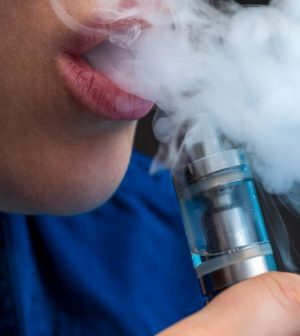- Could Artificial Sweeteners Be Aging the Brain Faster?
- Techniques for Soothing Your Nervous System
- Does the Water in Your House Smell Funny? Here’s Why
- Can a Daily Dose of Apple Cider Vinegar Actually Aid Weight Loss?
- 6 Health Beverages That Can Actually Spike Your Blood Sugar
- Treatment Options for Social Anxiety Disorder
- Understanding the Connection Between Anxiety and Depression
- How Daily Prunes Can Influence Cholesterol and Inflammation
- When to Take B12 for Better Absorption and Energy
- Epsom Salts: Health Benefits and Uses
Vaping Shows More Links to Gum Disease

Cigarette smoking is infamous for promoting gum disease, and now a new study adds to evidence that vaping also exacts a toll on the teeth and gums.
Researchers found that people who use e-cigarettes have a unique bacterial composition in their mouths that likely spells trouble for their dental health. In fact, their oral microbes were more similar to that of cigarette smokers than to nonsmokers.
The findings, published Feb. 22 in the journal mBio, build on evidence that e-cigarettes inflict damage right where they enter the body — the mouth.
Researcher Deepak Saxena, a professor at NYU College of Dentistry in New York City, had a straightforward takeaway message: “If you don’t use e-cigarettes, don’t start.”
The study focused on the oral microbiome, the collection of bacteria that naturally dwell in the mouth. Oral bacteria continuously form a sticky film on the teeth called plaque, which can be controlled with daily brushing and flossing, plus regular dental cleanings.
But if plaque spreads below the gum line, bacterial toxins irritate the tissue and cause a chronic inflammatory response — better known as gum disease.
Cigarette smoking is known to make people more vulnerable to gum disease, according to the American Academy of Periodontology.
And in recent research, Saxena and his colleagues have seen evidence that vaping is no friend of the teeth and gums, either: Like cigarette smoking, vaping can upset the bacterial balance of the mouth, making it more prone to inflammation and infection.
In the new study, the researchers tracked the oral health of 84 adults over six months — some cigarette smokers, some e-cigarette users and some nonsmokers.
Overall, the researchers found, vapers showed a unique oral microbiome: It was, potentially, healthier than that of smokers, but differed from that of nonsmokers. And vapers’ oral microbes looked more like cigarette smokers’ in many ways.
Compared to nonsmokers, both smokers and vapers harbored greater amounts of the bacteria Selenomonas, Leptotrichia and Saccharibacteria. At the same time, certain bacteria known to promote gum disease — including Fusobacterium and Bacteroidales — were particularly abundant in the mouths of e-cigarette users.
“Their microbiome is worse than nonsmokers’, but they also have their own unique profile,” Saxena said.
What it ultimately means for vapers’ oral health is unclear. E-cigarettes are still relatively new, Saxena noted, so it’s not known whether they can promote oral conditions like leukoplakia — white patches in the mouth that can be precancerous.
But it does seem that gum disease in vapers is worse, versus nonsmokers, according to Saxena. All of the study patients had some degree of gum disease, but cigarette smokers were worst off, followed by e-cigarette users: At the outset, around 80% of conventional smokers had severe gum disease, as did roughly 40% of vapers.
Most nonsmokers, meanwhile, had mild or moderate gum disease.
While e-cigarettes do not burn tobacco, they have problematic ingredients of their own, Saxena pointed out.
The devices work by heating a liquid that contains nicotine and other substances, like propylene glycol, glycerol and flavoring. The heating creates a “vapor” and additional toxic chemicals that are inhaled.
Contrary to popular belief, it’s not a harmless water vapor, said Dr. Albert Rizzo, chief medical officer for the American Lung Association (ALA). Studies show that e-cigarette emissions harbor an array of heavy metals and chemicals known to promote cancer, he said.
Whether vapers will face the same lung disease risks that smokers do — including emphysema and chronic bronchitis — remains to be seen.
“We’re only in the second decade of e-cigarette use in the general public,” Rizzo noted.
But research on the shorter-term effects is worrying, he said, particularly given the popularity of e-cigarettes among teens and young adults who otherwise might never have used tobacco products.
Rizzo pointed to a recent ALA-funded study as an example: It found that young adults who vaped were at heightened risk of developing problems with wheezing and dry cough within a year of starting the habit.
Rizzo said the new findings support evidence that vaping alters the way the immune system works and not only in the lungs.
Both he and Saxena encouraged parents to talk to their kids about the dangers of vaping.
As for adults, e-cigarettes are touted as a way to help smokers kick the habit. However, Rizzo said, “there is no hard evidence that these devices are smoking cessation aids.”
People looking for help in quitting, he said, have proven options that include counseling (including free quit lines in every U.S. state) and medications approved by the U.S. Food and Drug Administration for smoking cessation.
More information
The American Lung Association has more on the health effects of vaping.
SOURCES: Deepak Saxena, PhD, MS, professor, molecular pathobiology, NYU College of Dentistry, New York City; Albert Rizzo, MD, chief medical officer, American Lung Association, Chicago; mBio, online, Feb. 22, 2022
Source: HealthDay
Copyright © 2026 HealthDay. All rights reserved.










